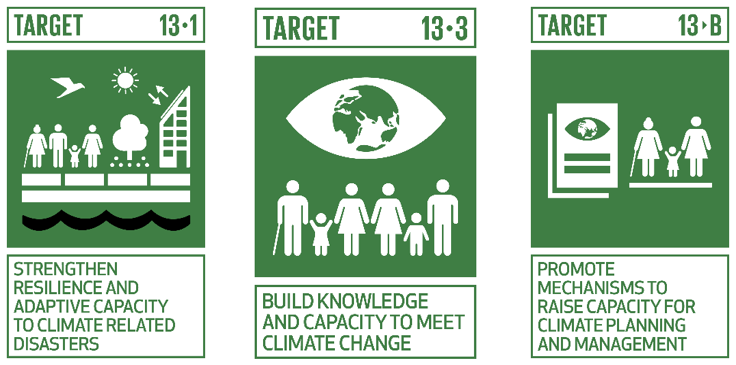Climate change is a real and undeniable threat to our entire civilization. The effects are already visible and will be catastrophic unless we act now. Through education, innovation and adherence to our climate commitments, we can make the necessary changes to protect the planet. These changes also provide huge opportunities to modernize our infrastructure which will create new jobs and promote greater prosperity across the globe (from The Global Goals to Sustainable Development).
Today you will learn about the participation of 3 portuguese research institutions (LNEC, CCMAR-Algarve and IPMA) in important projects contributing to the targets of SDG 13 in increasing the resilience and adaption to climate-related events.

Collaborative research infrastructures are essential to collect comprehensive information and identify long-term environmental changes. The two projects below (with collaboration from IPMA) show how European networks work as observatories for the marine environment.
EUROFLEETS+ is an alliance of European marine research infrastructures that brings together a significant group of key marine research actors, in particular research vessel operators, in Europe, North America and Oceania. This project has the participation of 42 marine institutes, universities, foundations and SMEs from 24 countries.
Watch here how the EUROFLEETS alliance works
EMSO-PT (European Multidisciplinary Sea floor and water column Observatory, Portugal) is a European Large Scale Research Infrastructure, consisting of multidisciplinary underwater observatories and other data processing support infrastructures. The goal of EMSO-PT is to generate continuous scientific data on marine environmental processes related to the interaction between the geosphere, biosphere and hydrosphere. This data is open access to all stakeholders. EMSO-PT is part of the European EMSO-ERIC initiative which is a consortium of 8 countries (France, Greece, Ireland, Italy, Portugal, Romania, Spain and United Kingdom) aiming at forming a European-wide sea floor and water column monitoring network.
Watch this short movie and learn how the multidisciplinary observatory works
The environmental data collected in the monitoring platforms can be used to understand and predict how marine life will be affected by climate change. In this project by CCMAR-Algarve the effects of ocean acidification on fish traits are investigated.
Is climate change affecting fishes’ sense of smell?
As humans continue to burn fossil fuel, CO2 dissolved in the ocean increases. This, in turn, lowers the pH of seawater - a process called ocean acidification. Serious concerns have been raised because we do not fully understand the impact of ocean acidification on marine ecosystems. In particular, little is known on how it may affect sensory systems and, consequently, behavioural responses.
Researchers at the CCMAR-Algarve, in project ODORACID, have been studying how ocean acidification affects the olfactory sensitivity of fish and the cellular mechanisms involved. They found that even a small decrease in pH significantly reduces olfactory sensitivity to some - but not all - odorants. This may negatively impact food-search and predator avoidance, for example. Crucially, fish are unable to adapt - at least in the short term - which means that effects may last many years. However, ultimate consequences on the ecosystem are difficult to predict and invertebrates and apex predators need to be studied.
Learn more about the ODORACID project
Another important line of action in the fight against climate change is the development of tools that increase the resilience of communities to climate-related hazards. The projects below (with collaboration from LNEC) provide tools for adapting the water cycle to climate change.
- RESCUE, Resilience to cope with climate change in urban areas, is a H2020 project which developed a resilience assessment framework (RAF tool) and other practical and innovative models and tools to end-users facing climate change to build more resilient cities. Learn more about the RESCUE project.
- BINGO is a H2020 project which provides practical knowledge and tools to end users, water managers, decision and policy makers affected by climate change to enable them to better cope with specific climate related challenges, in particular for highly vulnerable water resources of strategic importance. It addressed average and extreme conditions of climate change scenarios in six areas across Europe. Learn more about the BINGO project